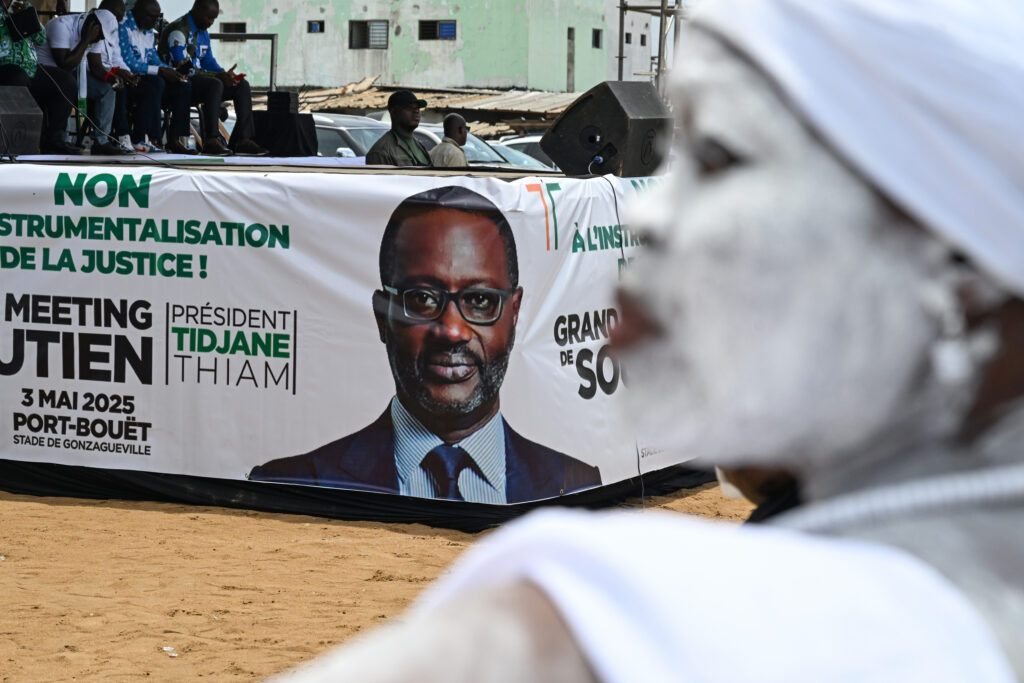In the run-up to Ivory Coast’s October presidential election at least seven government critics have found themselves behind bars, in what experts have called a government push to silence the opposition.With the west African country having a history of deadly unrest around election time, the arrests have reopened the long-running debate over the country’s justice system, accused of doing the government’s bidding.For civil society activist Pulcherie Gbalet, who was herself twice arrested and imprisoned in 2020 and 2022, “opposition figures are kidnapped from their homes by armed men, without explanation, instead of being simply issued a courts summons”.Besides the detentions, the courts have also barred the leader of Ivory Coast’s main opposition party, Tidjane Thiam, and former president Laurent Gbagbo, a bitter rival of current head of state Alassane Ouattara, from running.Though hard to prove, it is “very difficult not to draw a link” between the court rulings and the upcoming elections, said Emile Suy Bi Gohore, a lawyer for Thiam’s PDCI party.Yet the government’s critics and neutral observers are wary of making that argument too stridently, out of fear of becoming a target themselves. Even members of Ouattara’s own party, the RHDP, have found themselves in the dock. Former minister Joel N’Guessan, who belongs to the RHDP, was thrown in jail for criticising the courts for excluding Gbagbo and Thiam, along with two other opposition figures. “If tomorrow there is unrest in the country, those who would bear the most responsibility are the judges,” N’Guessan told the press on June 17. N’Guessan was arrested and jailed the day after, accused of discrediting the decisions of the courts. After publicly apologising for his remarks, he was finally released on bail three weeks later. – ‘Unfortunate constant’ – Others have not seen such leniency, especially within Thiam’s PDCI party. At least five officials with the PDCI’s youth wing have been arrested and detained since June, many of them accused of “disturbing the public order”. Members of ex-president Gbagbo’s PPA-CI have likewise been targeted by the authorities. At the end of June, Gala Kolebi, a sociologist who handled the party’s communications, was sentenced to 18 months in prison for “spreading fake news”. Meanwhile the PPA-CI’s deputy secretary general, Charles Rodel Dosso, has been in jail awaiting trial since the beginning of October.He is suspected of having organised an unauthorised march against the cost-of-living crisis. His lawyer, Kano Ble, told AFP the charge was “a pretext”, part of “repression of the political opposition” by judges “subservient to the ruling party”.Like elsewhere in Africa, the arrest of critics of the government is “an unfortunate constant in Ivory Coast”, political scientist Geoffroy Kouaotold AFP. Ouattara himself was the subject of an arrest warrant while in opposition, and had been excluded from the 1995 and 2000 presidential races, Kouao pointed out. “Opposition figures have always claimed the judiciary acts under orders from the government, yet once in power, they never make the reforms needed to strengthen (the courts’) independence,” Kouao argued. – ‘Electoral crisis’ -Ouattara, now 83-years-old and in power since 2011, has drawn out the suspense over whether he will run again.Yet US-based think tank Freedom House says the Ivorian courts have been “fully mobilized to support President Ouattara’s third term and remains supportive of his policies”.Augustin Yohou Dia Houphouet, one of the PDCI’s vice-presidents, has slammed “unjustified arrests against people demanding democracy and a political dialogue in the country”. While the exploitation of the courts by the authorities is “not new”, “it intensifies before elections”, said Herve Delmas Kokou, rights group Amnesty International’s executive director for Ivory Coast. Nonetheless the ruling party has regularly denied interfering in the electoral process, insisting that it leaves decisions to what it claims is an independent judiciary.Ivory Coast’s justice ministry did not wish to respond when contacted by AFP. Yet the government has repeatedly warned the opposition not to protest against the rulings. “Disorder will not be tolerated,” Communication Minister Amadou Coulibaly warned the PDCI in April, after the opposition party called for demonstrations. Gbalet, the activist, said she fears the crackdown will lead to another chapter in Ivory Coast’s long history of violence around election time. Many of those episodes are still fresh in the memory, not least the turmoil following Gbagbo’s challenge to Ouattara’s election win, which left some 3,000 dead in late 2010 and early 2011.”Today, the conditions for a new electoral crisis are all present,” Gbalet, the activist, said. “We will continue to fight so long as there are violations.”
